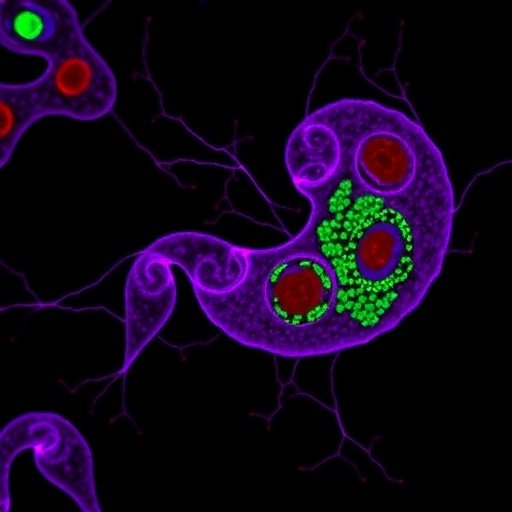Recent advancements in cancer research have uncovered intriguing mechanisms that tumors employ to evade the immune system. One such breakthrough involves the role of cancer-associated fibroblasts (CAFs) in gastric cancer, a prevalent digestive malignancy. Researchers Zhou, S., Xiao, L., Hu, L., and colleagues have unveiled a critical pathway through which CAFs promote immune evasion. Their study, published in the Journal of Translational Medicine, sheds light on the intricate biochemical interactions that facilitate tumor survival and proliferation by manipulating histone modifications and ubiquitination processes within host cells.
Histone lactylation, a relatively new post-translational modification, has emerged as a significant player in gene regulation and chromatin dynamics. This modification could profoundly impact how cancer cells orchestrate the immune response. The findings of Zhou et al. suggest that histone lactylation can suppress the ubiquitination of NCAPG, a key protein involved in cell cycle regulation. By mitigating NCAPG ubiquitination, CAFs essentially create a conducive environment for tumors to thrive while dodging the vigilance of the immune system.
Gastric cancer represents a formidable challenge, not only due to its late-stage diagnosis but also because of its complex tumor microenvironment. The contribution of CAFs in this environment cannot be overstated. These fibroblasts, often activated during inflammation and tumorigenesis, can secrete a variety of cytokines, chemokines, and growth factors that have a profound impact on tumor progression. CAFs orchestrate the immune landscape in such a manner that it fosters an immunosuppressive milieu, ultimately leading to poorer patient outcomes.
The research emphasizes the interplay between CAFs and tumor cells through a series of signaling pathways that involve not only histone modifications but also metabolic changes within the tumor microenvironment. It is becoming increasingly clear that these fibroblasts are not just passive support cells; rather, they actively participate in tumor bioenergetics and immune modulation. By studying the molecular circuitry involving histone lactylation and NCAPG, the authors provide a fresh perspective on potential therapeutic interventions aimed at reversing immune evasion.
Understanding the nuances of CAF-mediated immune evasion can help identify novel biomarkers for early detection of gastric cancer. Furthermore, the potential exploitation of histone modification pathways represents a promising avenue for therapeutic development. The realization that tumors can hijack normal cellular processes for their survival highlights the intricate balance between host defenses and cancer strategies. For instance, the histone lactylation process offers a target for pharmacological intervention; inhibiting this modification could restore a more robust immune response against tumor cells.
Another significant finding from the study is the potential of targeting the metabolic pathways linked to CAF activity. Cancer cells are known for their altered metabolism, often referred to as the Warburg effect, where they preferentially utilize glycolysis even in the presence of sufficient oxygen. CAFs also exhibit adaptive metabolic reprogramming that supports cancer growth. This metabolic interplay between CAFs and tumor cells represents an exciting frontier for therapeutic strategies aimed at disrupting this symbiotic relationship.
In terms of clinical implications, the research opens up several possibilities for combination therapies, which may involve oncogene inhibitors paired with agents that target CAF-driven pathways. By simultaneously attacking the cancer cells and the supportive stromal elements, it may be possible to enhance the efficacy of existing treatments, providing new hope for patients facing this aggressive disease.
The role of epigenetic modifications, particularly histone lactylation, extends beyond gastric cancer, entering the wider realm of oncology research. Investigators are now tasked with understanding how these modifications operate in various cancers and how they might be manipulated to favor anti-tumor immunity. The body of literature around histone modifications in cancer is rapidly expanding, promising to reveal deeper insights into cancer biology and potential therapeutic avenues.
Future research must aim to elucidate the comprehensive regulatory networks in which histone lactylation operates, including interactions with other epigenetic alterations such as methylation and acetylation. Establishing these connections will provide a clearer roadmap towards understanding how tumors confer resistance to therapies that initially appear effective. As scientists delve deeper into these mechanisms, we can expect a more sophisticated arsenal of treatment options tailored to exploit the vulnerabilities in these cancer-promoting pathways.
In conclusion, the study by Zhou et al. presents groundbreaking insights into the molecular dynamics of gastric cancer, emphasizing CAFs as key players in immune evasion through histone lactylation and NCAPG suppression. By unveiling these mechanisms, the research not only highlights the complexity of tumor biology but also paves the way for targeted therapies aimed at dismantling the immunosuppressive tactics employed by cancers. As the field of cancer immunology continues to evolve, the findings could serve as a catalyst for innovative approaches to treat gastric and potentially other types of cancers, ultimately striving for improved outcomes for patients.
Subject of Research: Role of cancer-associated fibroblasts in immune evasion in gastric cancer.
Article Title: CAFs promote immune evasion in gastric cancer through histone lactylation-mediated suppression of NCAPG ubiquitination.
Article References:
Zhou, S., Xiao, L., Hu, L. et al. CAFs promote immune evasion in gastric cancer through histone lactylation-mediated suppression of NCAPG ubiquitination. J Transl Med 23, 989 (2025). https://doi.org/10.1186/s12967-025-07013-0
Image Credits: AI Generated
DOI: 10.1186/s12967-025-07013-0
Keywords: Gastric cancer, cancer-associated fibroblasts, immune evasion, histone lactylation, NCAPG ubiquitination.




